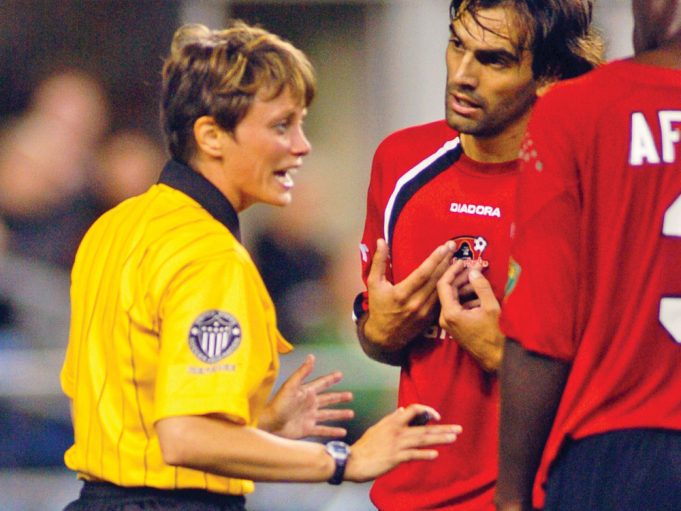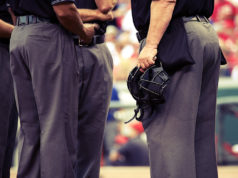Practice is synonymous with athletes, but practice can be as helpful to officials as it is to those playing the games. Whether it’s actually getting out on the court or field to work scrimmages or polishing your signals in front of a mirror, your skills are best enhanced through repetition.
Retired NFL referee Ed Hochuli, whose signaling was as precise as his explanations on the microphone were verbose, learned the importance of practice when he first joined the league staff. Hochuli remembers his first crew chief, Howard Roe, spending time working on his signals before every game. Hochuli joked about it at the time, but now sees the benefit. “You’re never too qualified to improve,” Hochuli said. “Being picky pays off.”
Such seemingly routine functions as throwing a penalty flag, tossing a jump ball, ensuring your 10-second count is accurate or removing the umpire mask without disturbing your hat can be practiced in the privacy of your home. But you might want to save practicing blowing the whistle for outdoors, however.
Toss the football around and do it as if you were relaying it to a crewmate. Having trouble getting the ball back to the pitcher? Ask one of your kids to play catch. But wear your chest protector so you can get used to how it will alter your throwing motion. It’s quite likely your son or daughter will appreciate the quality time spent with Mom or Dad. (Of course, you can always rely on the catcher to throw the ball to the pitcher.)
Also, do your best Howard Roe imitation and practice your signals. Make sure your signals are strong and crisp. You can find working on the mental as well as the physical part of officiating equally helpful. Think about how you handled situations you faced in seasons past. If you handled them well, think about why your technique worked and consider how it might prove equally helpful in other situations. If hindsight leads you to believe you might have done something better, consider alternative methods.
Watching a game on TV or in person? Watch the officials instead of the players. Notice their positioning, their body language and their mechanics. Be especially aware of what they do during timeouts or when the ball is dead.
You’ll likely find they don’t appear to be loafing; they’re observing players or are discussing situations with their partners.
If a situation arises in which a rule must be applied, try to remember if the rule is the same as it is for the level you work.
None of those techniques is will make you better overnight, but that’s the nature of practice. Work hard to actively improve over time and you might find yourself working more games at a higher level and with better competition sooner than you think.
What's Your Call? Leave a Comment:
Note: This article is archival in nature. Rules, interpretations, mechanics, philosophies and other information may or may not be correct for the current year.
This article is the copyright of ©Referee Enterprises, Inc., and may not be republished in whole or in part online, in print or in any capacity without expressed written permission from Referee. The article is made available for educational use by individuals.
















